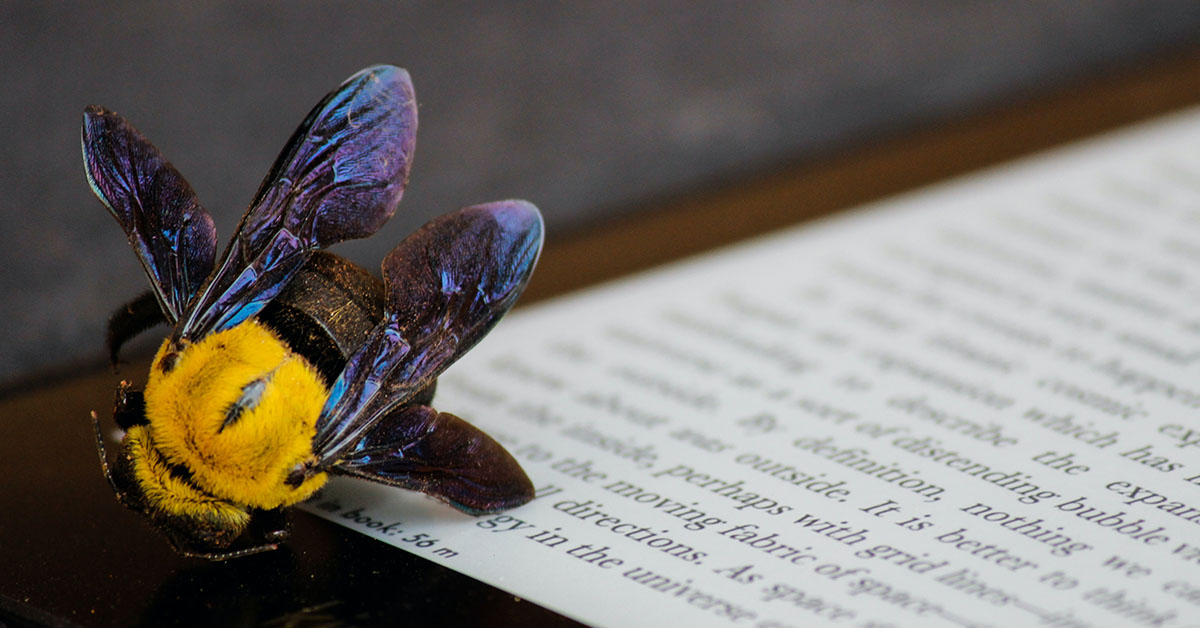A society aims to fix what’s wrong with English
Late this month, some 200 adolescent super-spellers will descend on the Gaylord National Resort & Convention Center, across the Potomac from Washington, DC, to compete in the annual Scripps National Spelling Bee.
Chances are, BeeMan will also show up, picketing outside—good-naturedly, to be sure. Representing the Simplified Spelling Society, BeeMan will be there not to protest the event or cast aspersions on the youthful entrants, but to call attention to the brain-busting spelling quirks and quiddities of the English language.
In past years, BeeMan—who is sometimes not one man but several or even a motley crew of men, women and bee-costumed children—has carried signs reading “Enuf is enuf but enough is too much” and “I’m thru with through.” The mood is light-hearted but the message is serious; English-language spelling norms make no sense and cry out for simplification.
It’s not a particularly modern concern. Sir Isaac Pitman, better known for inventing shorthand, championed simplified spelling in the late 1800s. In 1906 President Theodore Roosevelt directed the U.S. Printing office to adopt a simplified system in which the spelling of some 300 words would be modified. Many of the changes were reasonable, such as those swapping out British spellings for more intuitive New World ones, like omelet for omelette, and check for cheque. Others raised some eyebrows—kist for kissed, altho for although, clapt for clapped. While luminaries like Mark Twain and William James got behind the idea, the public nixt it and TR abandoned it within a few years.
But it didn’t die. In 1912 the Simplified Spelling Sosieti—later to become the Simplified Spelling Society—published Nurseri Riemz and Simpl Poemz, which included such favorites as “Litl Boi Bluu” and “Roc-a-bie Baibi.” In the 1930s the Chicago Tribune incorporated simplified versions of 80 words into its stylebook, including lether, trafic, frate, thoroly and crum. For more than 20 years, only those spellings were permitted in Tribune copy; the practice was abandoned in 1955. “Teachers were having trouble with it,” explained the paper’s editor. “They’d tell a child a way to spell a word, and he’d bring in a Tribune to prove the teacher wrong.”
In its most extreme manifestations, simplified spelling has generally struck all but its most ardent proponents as bizarre. In a letter to the Times of London, Isaac Pitman, an avowed vegetarian and teetotaler, wrote, “I gradiuali rekuvered mei dijestiv pouer, and have never sins nown, bei eni pain, that I hav a stumak.” The Times printed the letter exactly as Pitman had written it—no doubt to expose its dottiness. At Carpenter Group, we doubt that the world is ready to do business with privit ekwitee fermz or other finanshul servisses cumpaneez. At least not yet.
But the English language, with its maddening profusion of silent letters, and nonsensical inconsistencies, could clearly do with some selective fine-tuning. Why should “colonel” and “kernel” be pronounced the same? Why are “rough,” “cough,” “bough” and “through” all pronounced differently? How is it possible that “ghoti” could be read as “fish,” as George Bernard Shaw among others observed?*
”The question,” writes John McWhorter, who covers all things linguistic in the New York Times, “is whether we’ll proceed until the end of time making do with a woefully goofy spelling system when English is, for better or for worse, the world’s closest thing to a universal language, imposed on millions of innocents who really deserve better.”
To be fair, the Simplified Spelling Society has not endorsed any one system, instead raising awareness of the need to rethink how we spell words. As the late spelling reform advocate Elizabeth Kuizenga said, “It is our hope that English will finally catch up with the many modern languages, such as German, Dutch, Spanish, Russian and Czech, which have overhauled their spelling systems in the last century, and which have much higher literacy rates as a result.”
Of course, the reconfiguring of words to read exactly as they’re pronounced would likely put spelling bees out of business. That has never been the Simplified Spelling Society’s aim. “We are just doing our part to agitate in a nice way,” one BeeMan told reporters. The picket sign he held read, “I luv spelling bees.”
*Read the “gh” as it’s sounded in “enough,” the “o” as in “women” and the “ti” as in “vacation.”




